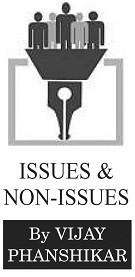A Denial Flat And Firm
| Date :22-Jun-2019 |

India, on Thursday, rejected a Pakistani media report claiming that New Delhi was ready for talks with Islamabad, saying Prime Minister Narendra Modi and External Affairs Minister S. Jaishankar made no such reference in their response to congratulatory messages from their counterparts in that country.
Responding to the queries regarding the replies to congratulatory messages by Pakistan’s Prime Minister Imran Khan and Foreign Minister Shah Mehmood Qureshi, Ministry of External Affairs Spokesperson Raveesh Kumar said, “As per the established diplomatic practice, PM and EAM have responded to the congratulatory messages received from their counterparts. ... In his message, PM said, ‘It is important to build an environment of trust, free of terror, violence and hostility’. There is the need for an ‘atmosphere free from the shadow of terror and violence’, the EAM emphasised”, Raveesh Kumar said. Asked if there was any reference to holding talks, he said, there was no such reference.
THE details -- of Pakistani assertions and Indian denials -- apart, it is clear from this episode that Pakistan is now showing certain keenness to open a dialogue with India. It is also clear that this is happening as part of a bigger plan since both, the Prime Minister and Foreign Minister of Pakistan, have tried to open a channel with their Indian counterparts. No matter what the Pakistani newspaper was told and what it reported, there is enough scope to read between the lines and say that Pakistan is now keen to restart what may be described as negotiations.
The response of the two Indian leaders, naturally, came on expected lines, as per the avowed thinking on the issue of terrorism that often involves innocent civilians. The flat and firm denial by India about any Indian willingness to open talks, says everything.
There are some elements within India advocating reopening of some channels for a dialogue with Pakistan. On the surface, their argument appears impeccable that nothing can be achieved if the ties are frozen. To such arguments, India’s official response is clear, to use the words of Mr. Narendra Modi during the nationwide campaign before 2014 Lok Sabha elections: ‘Words of peace often get drowned in the sounds of bombs and bullets, and so there cannot be any peace talks when terror is on’.
This policy-line has had no chance to be changed in the intervening years. Much to the contrary, Pakistan-based terrorists made every effort to ensure that India stayed away from any type of dialogue with Pakistan. Each time a possibility emerged that a channel may be opened, bombs and bullets got sprayed to disturb the process. In the past many years, India has collected a massive body of evidence to believe firmly that the terrorists have been sponsored by the Pakistani authorities as part of their foreign policy operations. For Pakistan, terror is a tool (even though it also has suffered from its ill-effects) to promote certain foreign policy objectives. That those objectives are unholy, is another story, but that they are there is a fact that no one can ever deny.
There are elements in India’s intelligentsia that believe that Prime Minister Mr. Imran Khan could be a good enough person with whom a meaningful dialogue could be had. For, they argue, he is a man who believes in internationalism as life’s larger philosophy as he has spent some of the best years of his life as a cricketer in a totally cosmopolitan environment and therefore can understand the trappings of collectivism and accommodation.
Unfortunately, India has had no evidence of existence of any such philosophical approach in Mr. Imran Khan’s conduct as Prime Minister, at least until now. He may be using a mild language, but that’s all there is to it.
As for India, there is no need to seek any alteration in the avowed foreign policy-line -- of saying ‘no’ to any dialogue with Pakistan until it erases all signs of its complicity with terror. That is what the Ministry of External Affairs did -- denying promptly the Pakistani media reports about New Delhi’s willingness to open a dialogue with Islamabad.
This denial must set the issue at rest. Mr. Imran Khan, however, may not stop making his efforts. For, as per the compulsions of his image-projection internationally, he must keep making sounds of peace-seeking. If he does not, he will lose whatever credibility and goodwill he may be enjoying in the global community.
In India, we have understood Mr. Khan’s compulsions. That is the reason why our Prime Minister has said, “It is important to build an environment of trust, free of terror, violence and hostility”. No talk of talks, no willingness to open a channel. Straight and simple, and of course in tune with diplomatic practice and international protocol -- of common courtesy and simple pleasantries.
Despite this, the Indian response does not suggest freezing of ties. Much to the contrary, it talks of the need to create an environment free from terror and violence and full of trust and mutual confidence. If the Pakistanis are wise and really committed to restarting a peace process, they would take the right hint and rectify their conduct and possibly redefine their foreign policy objectives. If they do not, it will be their problem and not that of India.
The authors and managers of India’s current foreign policy are wise enough not to slam the door close on possibility of a dialogue. But even as they talked of creating an environment of trust, they did not extend the hand to door-knob to turn it open. This is a wise and cautious approach, which the Pakistani newspaper misread. Nevertheless, that speculation did reveal Pakistan’s current condition.